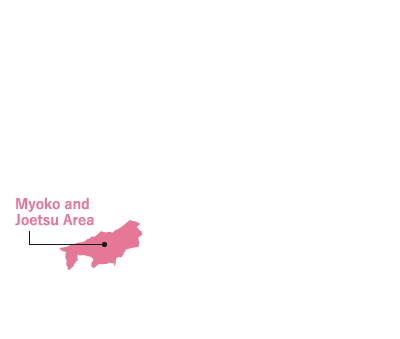
Tour the Seaside and Cross over to an Island




1
Kotakigawa Jade Valley
-
It is known as the place of Jade, and familiar with many people Takanami Pond with the backdrop of Myojoyama Mountain is also beautiful. There is also an observatory and fishing park with pedestrian path, so you can enjoy the attraction of the grand nature.

2
Takanami-no-Ike Pond
-
This pristine remote region sits at 540 meters above sea level, and is a certified UNESCO World Geopark. Within it is Takanami-no-Ike Pond, a 13-meter-deep reservoir that holds water throughout the year, flaunting a kaleidoscope of colors with each passing season.
Set against the majestic cliffs of Mt. Myojo, lush trees mirror themselves on the pond's placid surface, forming captivating scenery and treating visitors to a rejuvenating experience. It’s also renowned for hosting giant fish rumored to reach lengths of up to 4 meters, making it a haven for nature enthusiasts.
There is also a resthouse, store, campground, and ground golf course, providing myriad ways to immerse yourself in the area's charm. Not far away is Hisui Gorge and a fishing park, adding to the fun.

3
Jade Beach
-
At some beaches in Itoigawa, instead of sand you'll find pebbles. Many of the pebbles come from the mountain in Itoigawa, slowly moving down the the river into the sea over decades. These beaches are called the Jade Coast. In summer the beaches are crowded with visitors. If you're lucky, you may even find some real jade!

4
Roadside Station "Marine Dream Nou"
-
Discover the charm of "Kaniya Yokocho," home to one of the region's premier direct sales stands for red snow crabs, along with the offerings of a sizable fresh fish center.
The station goes beyond seafood, providing an extensive array of souvenirs from Niigata Prefecture. Culinary delights await at the on-site restaurants, where you can savor the freshness of the sea. Its convenient car access adds to its popularity among visitors.
Don't miss the highlight of your visit – "Kaniya Yokocho," a vibrant lane adorned with shops specializing in Nou's signature red snow crab. Each store offers freshly harvested snow crabs from the Nou fishing port, allowing you to savor distinct flavors influenced by the boiling time and salt quantity. Engaging in conversation with the vendor's auntie adds to the joy of this culinary experience.
Indulge in your purchased crabs at "Kani Kani Kan," a complimentary rest area on-site. Complete with hand-washing facilities, the area also provides rentals for crab scissors and hand towels. On sunny days, consider relishing your meal at the Ocean Park behind Kaniya Yokocho, enhancing the delicious crab with a splendid view of the Sea of Japan.
Other enjoyable attractions on the premises include the marine museum "Etsuzan Maru," showcasing a historic ship that once served as a marine training vessel, and the Marine Museum "Kaiyo," providing insights into the rich history of Nou, a town that thrived as a fishing hub.

5
Joetsu Aquarium Umigatari
-
Renovated in June, 2018, its nickname is "Umigatari." The aquarium has more megallanic penguins than any other in Japan, and you can see them up close! You can also watch the dolphins' exciting jumps against the backdrop of the great Sea of Japan. It's full of attractions to see.

10 minutes by car to Naoetsu Port
1 hour and 20 minutes by high-speed car ferry: Get off at Ogi Port
1 minute by car
6
Tarai bune (Tub-turned boat)
-
“Taraibune” tub-boats were originally built for "isonegi-ryo," a fishing method where a glass box is used to look underwater for seafood from a floating tub. It was used to collect seaweed, abalone, turban shells, and more from the narrow, rocky, and reef-filled Ogi Coast. It is said to have been based on a laundry tub, and improved over time to its current form.
Yajima Taiken Koryukan, a facility on the cove with a view of Yajima and Kyojima islands, offers taraibune tub-boat rides for visitors. Explore the cove on a tub-boat and relish the picturesque scenery of Sado Island!

7
Nishimikawa Gold Park
-
Located on the historic site of Nishimikawa Gold Mine — said to be the oldest Mine in Sado — this hands-on museum offers a unique opportunity to explore Japan's rich gold mining heritage. One of the highlights is the Gold Panning Experience, an easy and enjoyable activity suitable for all ages. Guests can even have their collected gold processed into personalized keepsakes such as pendants or keychains (additional fee applies).
The facility also features an exhibition room that delves into the history of gold on Sado Island, as well as a gift shop offering original confections, jewelry, and other exclusive items.

8
Sado Gold Mine
-
The Sado Gold Mine served as Japan's largest gold and silver mine from 1601 to 1989. Remnants of its 400-year history, like tunnel ruins and mining facilities, have earned prestigious designations as National Important Cultural Properties, Historic Sites, and Heritages of Industrial Modernization. The site is also a candidate for UNESCO World Heritage status.
The Sado Gold Mine offers two routes accessible without reservation, each taking around 30-40 minutes. For larger groups or those with a keen interest in history, guided tours are also recommended, which run from April to November and take 70-100 minutes (reservations required). One tour is for groups of 10 or more from elementary school and above, while the other is for smaller groups of up to 10, junior high school-aged or older.
Afterwards, head down to the Kitazawa Floatation Plant, a vital part of the Sado Gold Mine operations, and a popular photo spot reminiscent of Hayao Miyazaki's film Laputa: Castle in the Sky. It was the first location in Japan where copper production technology was successfully adapted for the extraction of gold and silver.










































































